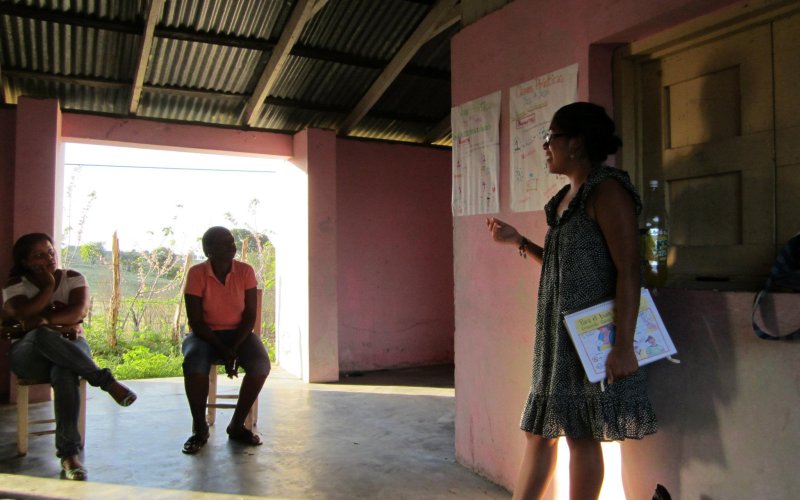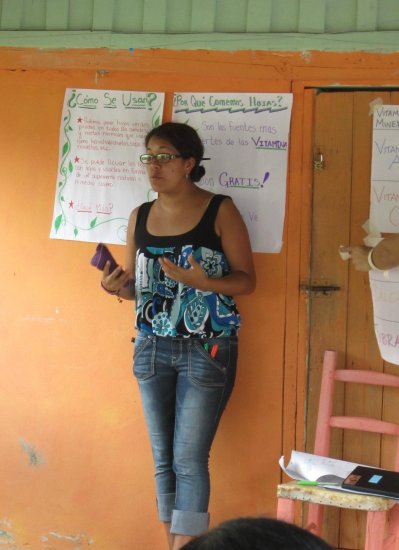The Peace Corps and Public Health: Insight from MPH Student Melissa Puicon-Healey

March 29, 2023
Melissa Puicon-Healey, an MPH student at UAlbany, is a Coverdell fellow and a returned Peace Corps volunteer. She has over ten years of experience working with underserved and underrepresented communities both abroad and in the United States, and currently serves as the communicable disease program coordinator and supervising public health nurse for Schenectady County.
“Serving in the Peace Corps has made me a better public health professional,” Puicon-Healey says. “It’s also shaped me into the person I am today and had a profound impact on my life and my career.”
She served in the Dominican Republic in 2010 as a health volunteer, working on various projects while immersing herself in her community about 20 minutes from the Haitian border.
“The communities in my area were very rural and tight-knit, and most households were related to one another. This made it especially important for me to build rapport in the community and take the time to build relationships with those around me,” she explains.
As a Peace Corps health volunteer, Puicon-Healey conducted a community needs assessment, trained community members to be health promoters, worked on a cleaner indoor air initiative to combat frequent respiratory infections, and taught health education. The community where she served did not have consistent electricity or running water, and did not have a formal classroom for teaching activities.
“For anyone in the field of public health, serving in the Peace Corps pushes you to think outside the box on how you can creatively accomplish your program goals,” Puicon-Healey explains. “We’re used to learning and teaching with technology, but that wasn’t available at the time. I learned that most of the women that I was to teach didn’t know how to read and write, so I ended up drawing a lot of the topics and using visual aids to teach my curriculum.”
Puicon-Healey also expresses the importance of understanding peoples’ values, cultural norms, and beliefs, as they have a significant impact on lifestyle choices and decisions about health.
So what does Puicon-Healey recommend for those who want to serve in the Peace Corps?
“Be resourceful and adaptable, and have a willingness to compromise. Build meaningful relationships with the people around you both in a personal and professional capacity.”
Puicon-Healey notes that in public health, you don’t always get to directly see the impact you’re making—and the same is true for the Peace Corps.
“I joined the Peace Corps thinking, ‘this is great, I’m going to impact lives and see change’. But when you’re working on behavioral change and life skills—domestically or abroad—it takes time, and you may not immediately see the impact you’re having. Fortunately, I kept in touch with my host family and stayed connected on social media and was able to see the changes happening slowly over time in the community.”
While serving, Puicon-Healey realized her passion for health education and pursued her nursing degree when she returned to the United States. She became a public health nurse with the goal to continue to educate and work closely with communities in preventative health.
For the last four years, Puicon-Healey has been working at a local health department, and she consistently uses what she learned in the Peace Corps—such as taking her time to build rapport, and being aware of cultural norms— as she assists the community. She uses her lessons learned with those she supervises, her coworkers, and community partners as well.
“I highly recommend that public health students look into the Peace Corps to see if it may be a good fit for them,” Puicon-Healey explains. “Every experience is very different, but regardless of what you do and where you are placed, you’ll gain useful skills to make an impact on the people you meet throughout your life and on your own.”
Any students who may be interested in learning more about the Peace Corps and careers in public health can contact John Justino, director of UAlbany’s Center for Global Health, at [email protected] or (518) 402-0385.



